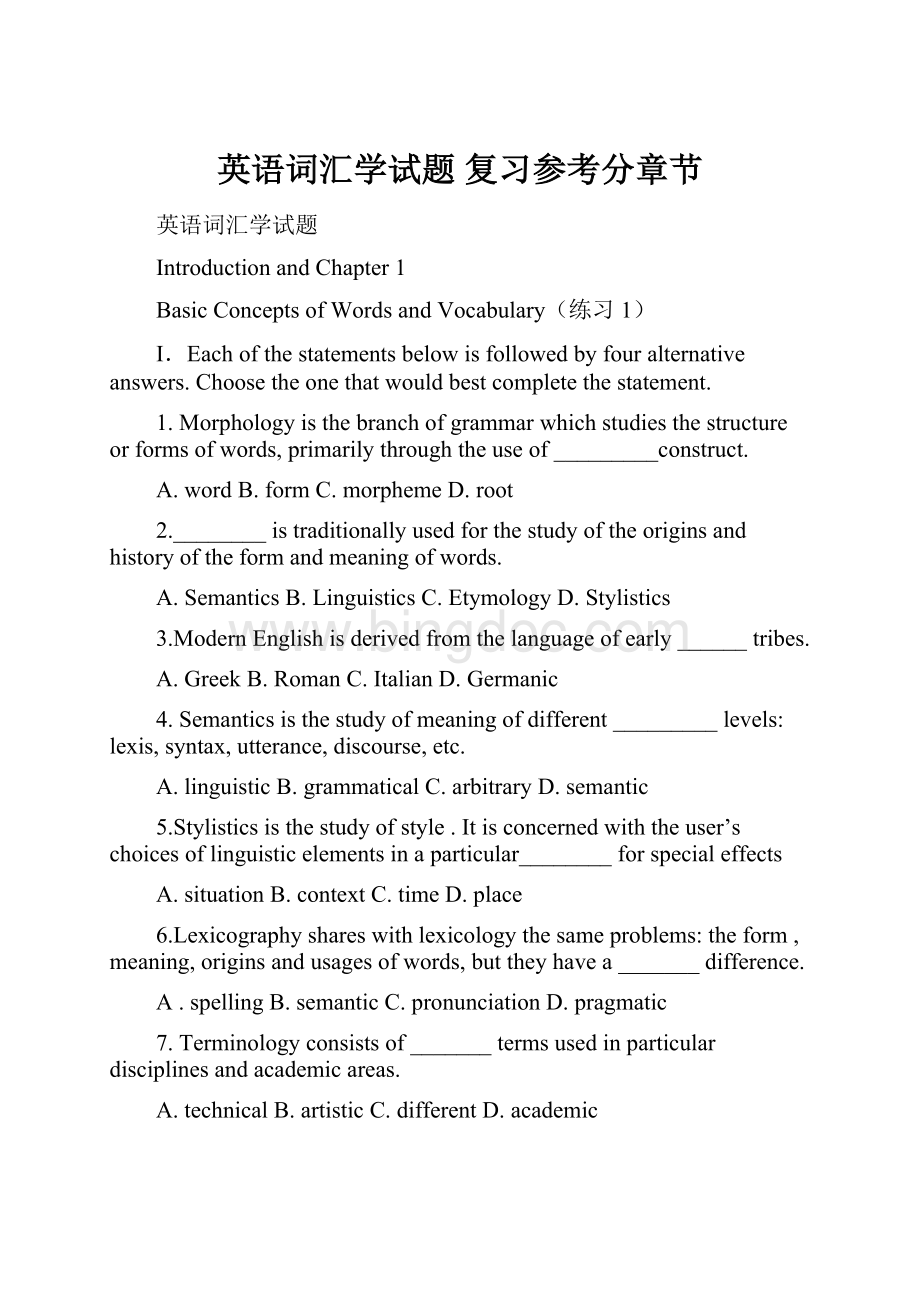英语词汇学试题 复习参考分章节.docx
《英语词汇学试题 复习参考分章节.docx》由会员分享,可在线阅读,更多相关《英语词汇学试题 复习参考分章节.docx(56页珍藏版)》请在冰点文库上搜索。

英语词汇学试题复习参考分章节
英语词汇学试题
IntroductionandChapter1
BasicConceptsofWordsandVocabulary(练习1)
I.Eachofthestatementsbelowisfollowedbyfouralternativeanswers.Choosetheonethatwouldbestcompletethestatement.
1.Morphologyisthebranchofgrammarwhichstudiesthestructureorformsofwords,primarilythroughtheuseof_________construct.
A.wordB.formC.morphemeD.root
2.________istraditionallyusedforthestudyoftheoriginsandhistoryoftheformandmeaningofwords.
A.SemanticsB.LinguisticsC.EtymologyD.Stylistics
3.ModernEnglishisderivedfromthelanguageofearly______tribes.
A.GreekB.RomanC.ItalianD.Germanic
4.Semanticsisthestudyofmeaningofdifferent_________levels:
lexis,syntax,utterance,discourse,etc.
A.linguisticB.grammaticalC.arbitraryD.semantic
5.Stylisticsisthestudyofstyle.Itisconcernedwiththeuser’schoicesoflinguisticelementsinaparticular________forspecialeffects
A.situationB.contextC.timeD.place
6.Lexicographyshareswithlexicologythesameproblems:
theform,meaning,originsandusagesofwords,buttheyhavea_______difference.
A.spellingB.semanticC.pronunciationD.pragmatic
7.Terminologyconsistsof_______termsusedinparticulardisciplinesandacademicareas.
A.technicalB.artisticC.differentD.academic
8.__________referstothespecializedvocabulariesbywhichmembersofparticulararts,sciences,trades,andprofessionscommunicateamongthemselves.
A.SlangB.JargonC.DialectalwordsD.Argot
9._________belongstothesub-standardlanguage,acategorythatseemstostandbetweenthestandardgeneralwordsincludinginformalonesavailabletoeveryoneandin-groupwords.
A.JargonB.ArgotC.DialectalwordsD.Slang
10.Argotgenerallyreferstothejargonof_______.Itsuseisconfinedtothesub-culturalgroupsandoutsiderscanhardlyunderstandit.
A.workersB.criminalsC.anypersonD.policeman
11.________arewordsusedonlybyspeakersofthedialectinquestion.
A.ArgotB.SlangC.JargonD.Dialectalwords
12.Archaismsarewordsorformsthatwereoncein_________usebutarenowrestrictedonlytospecializedorlimiteduse.
A.commonB.littleC.slightD.great
13.Neologismsarenewly-createdwordsorexpressions,orwordsthathavetakenon______meanings.
A.newB.oldC.badD.good
14.Contentwordsdenoteclearnotionsandthusareknownas_________words.Theyincludenouns,verbs,adjectives,adverbsandnumerals.
A.functionalB.notionalC.emptyD.formal
15.Functionalwordsdonothavenotionsoftheirown.Therefore,theyarealsocalled_______words.Prepositions,conjunctions,auxiliariesandarticlesbelongtothiscategory.
A.contentB.notionalC.emptyD.new
II.Completethefollowingstatementswithproperwordsorexpressionsaccordingtothecoursebook.
16.Lexicologyisabranchoflinguistics,inquiringintotheoriginsand_____ofwords.
17.Englishlexicologyaimsatinvestigatingandstudyingthe______structuresofEnglishwordsandwordequivalents,theirsemantics,relations,_____development,formationand______.
18.Englishlexicologyembracesotheracademicdisciplines,suchasmorphology,______,etymology,stylistics,________.
19.Therearegenerallytwoapproachestothestudyofwords,namelysynchronicand_______.
20.Languagestudyinvolvesthestudyofspeechsounds,grammarand_______.
III.MatchthewordsorexpressionsinColumnAwiththoseinColumnBaccordingto1)basicwordstockandnonbasicvocabulary2)contentwordsandfunctionalwords3)nativewordsandborrowedwords4)characteristicsofthebasicwordstock.
AB
21.Stability()A.E-mail
22.Collocbility()B.aught
23.Jargon()C.por
24.Argot()D.upon
25.Notionalwords()E.hypo
26.Neologisms()F.atheart
27.Aliens()G.man
28.Semantic-loans()H.dip
29.Archaisms()I.fresh
30.Emptywords()J.emir
IV.Studythefollowingwordsorexpressionsandidentify1)characteristicsofthebasicwordstock2)typesofnonbasicvocabulary.
31.dogcheap()32achangeofheart()
33.can-opener()34.Roger()
35.bottomline()36.penicillin()
37.auld()38.futurology()
39.brethren()40.take()
V.Definethefollowingterms.
41.word42.Denizens43.Aliens44.Translation-loans45.Semantic-loans
VI.AnswerthefollowingQuestions
46.Illustratetherelationshipbetweensoundandmeaning,soundandformwithexamples.
47.Whatarethemaincharacteristicsofthebasicword-stock?
Illustrateyourpointswithexamples.
48.Givethetypesofnonbasicvocabularywithexamples.
VII.Analyzeandcommentonthefollowing.
49.Classifythefollowingwordsandpointoutthetypesofwordsaccordingtonotion.
earth,cloud,run,walk,on,of,upon,be,frequently,the,five,but,a,never.
50.GroupthefollowingborrowedwordsintoDenizens,Aliens,Translation-loans,Semantic-loans.
Dream,pioneer,kowtow,bazaar,lama,master-piece,port,shirt
KeytoExercises:
I.1.A2.C3.D4.A5.B6.D7.A8.B9.D10.B11.D12.A13.A14.B15.C
II.16.meanings17.morphological,historical,usages18.semantics,lexicography19.diachronic20.vocabulary
III.21.G22.F23.E24.H25.C26.A27.J28.I29.B30.D
IV.31.thebasicwordstock;productivity
32.thebasicwordstock;collocability
33.thebasicwordstock;argot
34.nonbasicwordstock;slang
35.nonbasicwordstock;jargon
36.nonbasicwordstock;terminology
37.nonbasicwordstock;dialectalwords
38.nonbasicwordstock,neologisms
39.nonbasicwordstock;archaisms
40.thebasicwordstock;polysemy
V-----VI.(seethecoursebook)
VII.49.Contentwords:
earth,clould,run,walk,frequently,never,five
Functionalwords:
on,of,upon,be,the,but,a.
50.Denizens:
port,shirt,
Aliens:
bazaar,kowtow
Translation-loans:
lama,masterpiece
Semantic-loans:
dream,pioneer
Chapter2TheDevelopmentoftheEnglishVocabularyandChapter3WordFormationI(练习2)
I.Eachofthestatementsbelowisfollowedbyfouralternativeanswers.Choosetheonethatwouldbestcompletethestatement.
1.Itisassumedthattheworldhasapproximately3,000(someputit5,000)languages,whichcanbegroupedintothebasisofsimilaritiesintheirbasicwordstockandgrammar.
A.500B.4000C.300D.2000
2.TheprehistoricIndo-Europeanparentlanguageisthoughttobeahighly______language.
A.inflectedB.derivedC.developedD.analyzed
3.Afterthe_________,theGermanictribescalledAngles,Saxons,andJutescameingreatnumbers.
A.GreeksB.IndiansC.RomansD.French
4.Theintroductionof________hadagreatimpactontheEnglishvocabulary.
A.HinduismB.ChristianityC.BuddhismD.Islamism
5.Inthe9thcenturythelandwasinvadedagainbyNorwegianandDanishVikings.Withtheinvaders,many________wordscameintotheEnglishlanguage.
A.GreekB.RomanC.CelticD.Scandinavian
6.Itisestimatedthatatleast______wordsofScandinavianoriginhavesurvivedinmodernEnglish.
A.500B.800C.1000.D.900
7.TheNormansinvadedEnglandfromFrancein1066.TheNormanConqueststartedacontinualflowof______wordsintoEnglish.
A.FrenchB.GreekC.RomanD.Latin
8.Bytheendofthe_______century,Englishgraduallycamebackintotheschools,thelawcourts,andgovernmentandregainedsocialstatus.
A.12thB.13thC.14thD.15th
9.Asaresult,Celticmadeonlya________contributiontotheEnglishvocabulary.
A.smallB.bigC.greatD.smaller
10.TheBalto-SlaviccomprisessuchmodernlanguagesasPrussian,Lithuanian,Polish,Czech,Bulgarian,Slovenianand_______.
A.GreekB.RomanC.IndianD.Russian
11.IntheIndo-IranianwehavePersian,Bengali,Hindi,Romany,thelastthreeofwhicharederivedfromthedeadlanguage.
A.SanskritB.LatinC.RomanD.Greek
12.Greekisthemodernlanguagederivedfrom_______.
A.LatinB.HellenicC.IndianD.Germanic
13.ThefiveRoamancelanguages,namely,Portuguese,Spanish,French,Italian,RomanianallbelongtotheItalicthroughanintermediatelanguagecalled_______.
A.SanskritB.LatinC.CelticD.Anglo-Saxon
14.The________familyconsistsofthefourNorthernEuropeanLanguages:
Norwegian,Icelandic,DanishandSwedish,whicharegenerallyknownasScandinavianlanguages.
A.GermanicB.Indo-EuropeanC.AlbanianD.Hellenic
15.Bytheendofthe_______century,virtuallyallofthepeoplewhoheldpoliticalorsocialpowerandmanyofthoseinpowerfulChurchpositionswereofNormanFrenchorigin.
A.10thB.11thC.12thD.13th
II.Completethefollowingstatementswithproperwordsorexpressionsaccordingtothecoursebook.
16.NowpeoplegenerallyrefertoAnglo-Saxonas_______.
17..IfwesaythatOldEnglishwasalanguageoffullendings,MiddleEnglishwasoneof______.
18.ItcanbeconcludedthatEnglishhasevokedfromasyntheticlanguage(OldEnglish)tothepresent_____language.
19.Thesurvivinglanguagesaccordinglyfallintoeightprincipalgroups,whichcanbegroupedintoanEasternset:
Balto-Slavic,Indo-Iranian,ArmenianandAlbanian;aWesternset:
Celtic,Italic,Hellenic,_______.
20.ItisnecessarytosubdivideModernEnglishintoEarly(1500-1700)and_____ModernEnglish.
III.MatchthewordsorexpressionsinColumnAwiththoseinColumnBaccordingto1)originofthewords2)historyoffEnglishdevelopment3)languagefamily.
AB
21.Celtic()A.politics
22.religious()B.moon
23.Scandinavian()C.Persian
24.French()D.London
25.OldEnglish()E.abbot
26.Dutch()F.skirt
27.MiddleEnglish()G.sunu
28.ModernEnglish()H.lernen
29.Germanicfamily()I.freight
30.Sanskrit()J.Norwegian
IV.Studythefollowingwordsorexpressionsandidentifytypesofmorphemesunderlined.
31.earth()32.c